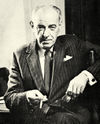The Powder Barrel
The Powder Barrel is a 1965 suspense novel by the British author William Haggard published in England by Cassell and in the United States by Ives Washburn. It was Haggard's seventh of 21 books involving his protagonist Colonel Charles Russell, the urbane head of the unobtrusive but lethal Security Executive, a government counter-intelligence agency clearly based on the actual MI5 or Security Service, where he moves easily and gracefully along C.P. Snow's Corridors of Power in Whitehall. Like Haggard's earlier books it has standard elements of suspense thrillers along with detailed examinations of character, but in this case with more scenes of direct action and somewhat less dissection of character and motivation than in the first three books.
Plot
Protagonist is perhaps too strong a word to describe Colonel Russell. As Haggard himself wrote about his fiction:
My novels are chiefly novels of suspense with a background of international politics. A Colonel Charles Russell of the Security Executive, a not entirely imaginary British counter-espionage organization, while not a protagonist in the technical sense, holds the story line together in the background by his operations, while the characters in the foreground carry the action."[1]
Reception and/or Appraisal
The New York Times rated it very highly:
The New York Times wrote: To return to the genuine, complex and subtle story of international intrigue, there is William Haggard's THE POWDER BARREL (Washburn, $3.95). Here an oil sheik is involved; and Chinese intervention in his sheikdom leads to an unprecedented collaboration of British and Russian secret services. But what really counts is the man-to-woman relationship of the foreign minister and the sheik's fascinatingly unpredictable sister. A spellbinder of a book, with Haggard's inimitable skill in making intrigue genuinely intriguing. [2]
Kirkus Reviews wrote: xcxxx [3]
